

«Decir a los niños que no se aprendan las cosas de memoria es un gran error» «Objetivo: Generar talento.
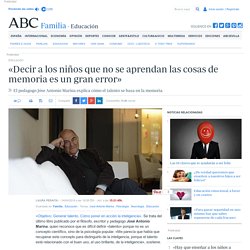
Cómo poner en acción la inteligencia». Se trata del último libro publicado por el filósofo, escritor y pedagogo José Antonio Marina, quien reconoce que es difícil definir «talento» porque no es un concepto científico, sino de la psicología popular. «Me parecía que había que recuperar este concepto para distinguirlo de la inteligencia, porque el talento está relacionado con el buen uso, el uso brillante, de la inteligencia», sostiene. -¿Por qué se ha puesto de moda hablar de talento? -La razón es económica. El talento tiene que ver con la acción, con la toma de decisiones y la generación de proyectos y, para ello, intervienen muchos aspectos como pensar bien, tener buena información, pero también supone gestionar bien las emociones y tener desarrolladas las virtudes de la acción: la perseverancia, la valentía, la tenacidad, el saber soportar el fracaso...
-¿Es innato? Eso se creía. -¿No se está haciendo ya? -¿De qué manera? -Y eso , ¿cómo se logra? ¿Es un fracaso la educación por competencias? Opinión de la maestra Petra Llamas García.
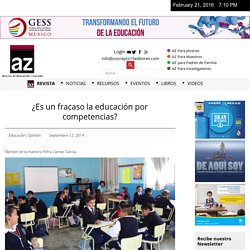
Get a Free EF Teacher Development Certificate. Teacher Development Certificate. How One Denver Turnaround School Went From Failing to Successful—by Emphasizing Joy. The staff at McGlone Elementary School has a mantra: Happy kids learn more.
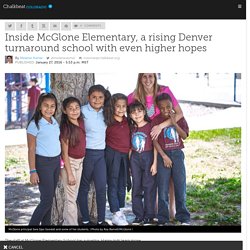
It’s why the extended-day school in far northeast Denver offers nearly two hours of specials like art and music per day, why the cheerful and affectionate principal keeps a few “golden tickets” clipped to her lanyard to give out as rewards and why the classrooms aren’t the hushed, sit-up-straight, no-excuses type you might find elsewhere. On a recent afternoon, two fifth grade boys in matching navy polo shirts and spiky hairdos huddled next to each other in teacher Matt Johnson’s math class.
Sharing a single notebook page, they worked to solve 1 divided by 3, their skinny elbows pressed together in the unselfconscious way of elementary school students. “It should be three halves!” I Lie About My Teaching. I liked Devon.
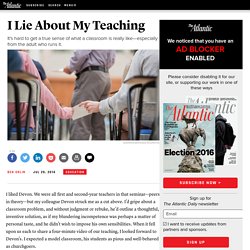
We were all first and second-year teachers in that seminar—peers, in theory—but my colleague Devon struck me as a cut above. I’d gripe about a classroom problem, and without judgment or rebuke, he’d outline a thoughtful, inventive solution, as if my blundering incompetence was perhaps a matter of personal taste, and he didn’t wish to impose his own sensibilities. Promoting Literacy and Empathy in the Artroom. As a high school Art teacher, I focus my curriculum and instruction on connections – connections between ideas and with the world outside the Artroom/Studio classroom.
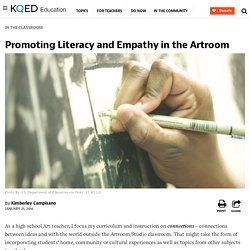
That might take the form of incorporating students’ home, community or cultural experiences as well as topics from other subjects in school. The Artroom is a place of learning – whether it’s about technique in order to render images and make objects, or the context and history of the many art forms and their practitioners. But perhaps more importantly, it is also a studio – an open and safe space to explore practices that call forth dispositions which impact learning. How To Be A Great Teacher, From 12 Great Teachers : NPR Ed. Harnessing the Incredible Learning Potential of the Adolescent Brain. How to Make Sure That Project-based Learning is Applied Well in Schools. By Thom Markham Now that project-based learning (PBL) is becoming more popular, the doubters and haters also have surfaced.
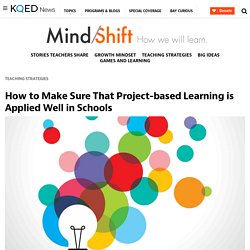
The recent anti-PBL message by David Brooks in the New York Times, which was fortunately well rebutted, exemplifies the resistance. Citing High Tech High in San Diego, Brooks’ core message is that PBL is a kind of mindless education dressed up by technology and devoid of the ‘wisdom’ taught in traditional schools. Given that there are probably another thousand-plus schools across the country embracing PBL, this is a serious charge. How to Make Sure That Project-based Learning is Applied Well in Schools. Sticky Grammar: Passive Songs. I'm sharing an activity for B1 students to practice passive voice through songs.
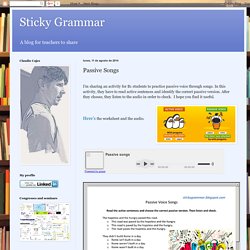
In this activity, they have to read active sentences and identify the correct passive version. After they choose, they listen to the audio in order to check. I hope you find it useful. Here's the worksheet and the audio. Once they finish with the songs in the worksheet, they listen to the last 5 segments and do the same process, only this time they provide the passive sentences. Just in case, here you have the lyrics:1- She takes me away to that special place.
Tier 2 Language Intervention for Diverse Preschoolers: An Early-Stage Randomized Control Group Study Following an Analysis of Response to Intervention. Disclosure: Trina D.
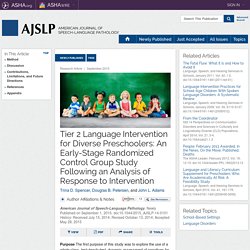
Spencer and Douglas B. Petersen developed the intervention examined in this study and may be entitled to royalties related to its sale. Smart Speech Therapy LLC. Why the Phrase 'It’s Not So Bad' Causes Treatment Problems. Editor’s note: This adaptation comes from a blog post written by Tatyana Elleseff for her Smart Speech Therapy blog.
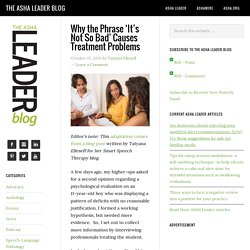
A few days ago, my higher-ups asked for a second opinion regarding a psychological evaluation on an 11-year-old boy who was displaying a pattern of deficits with no reasonable justification. I formed a working hypothesis, but needed more evidence. So, I set out to collect more information by interviewing professionals treating the student. I asked one about the quality of his graphomotor skills. Practice Math Like a Baby. I’ve always felt conflicted about repetitive practice.
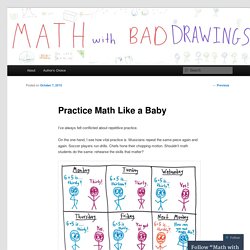
On the one hand, I see how vital practice is. Musicians repeat the same piece again and again. Soccer players run drills. Chefs hone their chopping motion. When Memorization Gets in the Way of Learning - Ben Orlin. I once caught an 11th-grader who snuck a cheat sheet into the final exam. At first, he tried to shuffle it under some scratch paper. When I cornered him, he shifted tactics. "It's my page of equations," he told me. TeachingChannel. Encouraging Students to Persist Through Challenges.
Academic Motivation Research. PERTS stands for the Project for Education Research That Scales. It is an applied research center at Stanford University. Our team partners with schools, colleges, and other organizations to improve student motivation and achievement on a large scale. In the process, we conduct research that enables us to improve our programs and to expand what is known about academic motivation. Mindset Kit - Home. Growth Mindset: How to Normalize Mistake Making and Struggle in Class. Carol Dweck’s research on growth mindset has become essential knowledge in education circles.
The Stanford psychologist found that children who understand that their brains are malleable and can change when working through challenging problems can do better in school. Now, many school districts are attempting to teach growth mindset to their students. At the core of this practice is the idea of “productive failure” (a concept Dr. Manu Kapur has been studying for over a decade)* and giving students the time and space to work through difficult problems.
Another key idea is to praise the process and effort a child puts in, not the final product. These mindset changes are easy to describe and dictate, but more challenging to implement. Angye Gaona, “Nascita volatile”, Thauma Edizioni 2012. Aarin Shapiro. How Finland Keeps Kids Focused Through Free Play - Tim Walker. Like a zombie, Sami—one of my fifth graders—lumbered over to me and hissed, “I think I’m going to explode! I’m not used to this schedule.” And I believed him. An angry red rash was starting to form on his forehead. Yikes, I thought. Linda Cliatt-Wayman: How to fix a broken school? Lead fearlessly, love hard. Sorprendente lista de tareas que ha dejado un profesor a sus alumnos para este verano. ¿Te atreves? Cesare Catà enseña en el instituto preuniversitario Don Bosco en Fermo, un pequeño pueblo del noreste de Italia. En vez de darles a sus estudiantes una lista de lecturas para el verano, Catà les ofreció 15 consejos de vida para hacer en vacaciones.
La lista, publicada en su página de Facebook, ha sido compartida por miles de estudiantes de todo el mundo. Hemos querido compartirlas con vosotros junto a los enlaces de muhimu que nos ha inspirado cada tarea (no olvides hacer click en cada link para ver nuestros consejos): Lesson plans – a waste of time? I realise I haven’t written anything for this blog for quite some time, so I’m really glad that a recent conversation on Twitter about observations and lesson plans with @ashowski and @getgreatenglish, who following our chat wrote a post too, motivated me to write a new post. The conversation was prompted by a blog post by @ashowski which you can read here. In a nutshell, Anthony argues that from the point of view of the observer a thorough lesson plan is essential as comparing it with the decisions made by the teacher during the lesson can “reveal the most interesting features of the teacher’s pedagogic abilities”.
Without this it would be impossible “to determine the extent of the teacher’s teaching abilities”. OTRA ESCUELA ES POSIBLE. Matar a un profesor — Esto no es una escuela. 11 Ways Finland’s Education System Shows Us that “Less is More”. When I left my 7th grade math classroom for my Fulbright research assignment in Finland I thought I would come back from this experience with more inspiring, engaging, innovative lessons.
I expected to have great new ideas on how to teach my mathematics curriculum and I would revamp my lessons so that I could include more curriculum, more math and get students to think more, talk more and do more math. This drive to do more and More and MORE is a state of existence for most teachers in the US….it is engrained in us from day one. There is a constant pressure to push our students to the next level to have them do bigger and better things. The lessons have to be more exciting, more engaging and cover more content. The War Against Teachers as Public Intellectuals in Dark Times. Parents’ evening: the questions that teachers never seem keen to answer ... You turn up for parents’ evening full of questions about your child. "La creatividad se aprende igual que se aprende a leer" Five Great Teachers On What Makes A Great Teacher : NPR Ed. When we began our 50 Great Teachers series, we set out to find great teachers and tell their stories.
50 Great Teachers: Socrates, The Ancient World's Teaching Superstar : NPR Ed. WATCH: How A Teacher Encouraged Her Students With An 'F' Remembering educator Rita F. Pierson. Dr Dario Banegas. Claudia Ferradas. US-based Filipino teacher cited for making algebra cool. 10 Errores que todo docente debería evitar. ¡Atención con el número #8! Five Things Teachers Do that Students Hate. “i’m going to italy” and other intermediate errors. Reactive and proactive teaching: which should we use in the language classroom? Lisa Nielsen: The Innovative Educator. Math, teaching, copious metaphors, and drawings that will never ever earn a spot on the fridge.